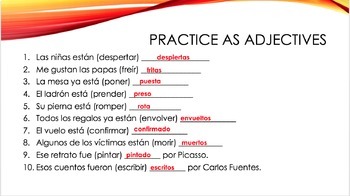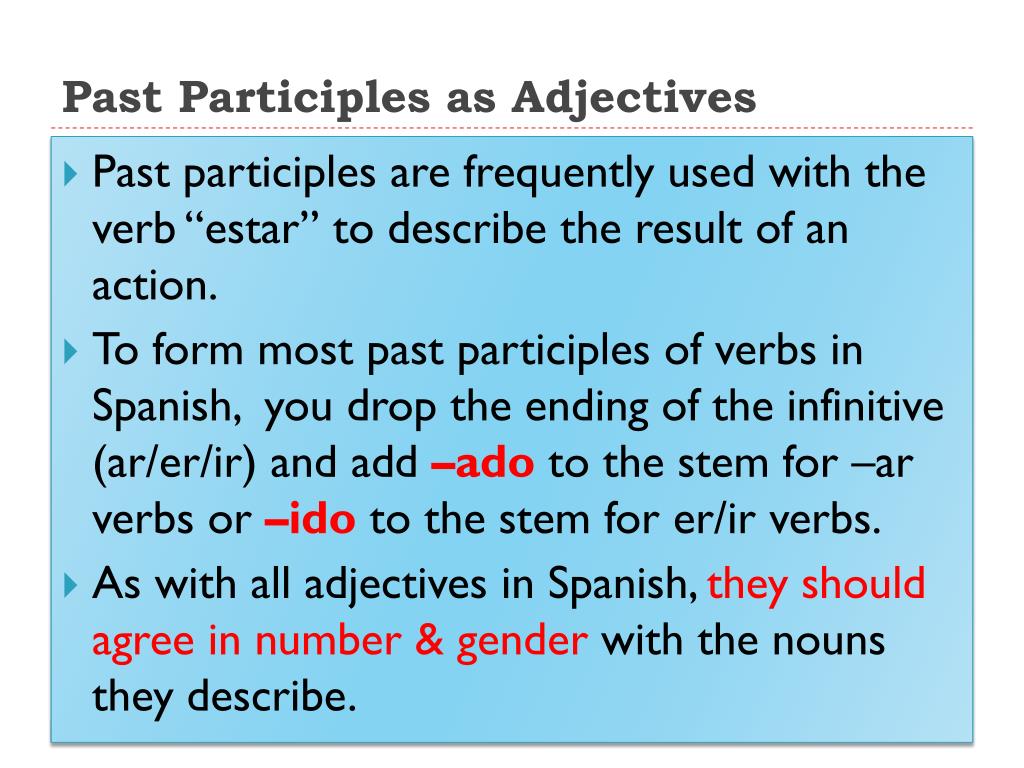

The opposite type of verb, which expresses a single, completed action, is termed a concrete verb (or a determinate verb).
#PAST PARTICIPLE SPANISH SENTENCE EXAMPLES SERIES#
abstract verb In the Slavic languages, a verb of motion whose motion is multidirectional (as opposed to unidirectional) or indirect, or whose action is repeated or in a series ( iterative). abstract noun A noun that denotes an idea, emotion, feeling, quality or other abstract or intangible concept, as opposed to a concrete item, or a physical object. absolutive case A case used to indicate the patient or experiencer of a verb's action. (More at Indo-European ablaut on Wikipedia. A specific form of ablaut is referred to as a grade see for instance zero-grade. In the Germanic languages, it forms the basis of the strong verbs. The system is used for purposes of inflection and word derivation. ablaut In Proto-Indo-European, or any of its descendants (the Indo-European languages), a system of vowel alternation in which the vowels that are used in various parts of the word can change depending on meaning. In some languages, such as Latin, this case has acquired many other uses and does not strictly indicate separation anymore. For example, if English had a fully productive case system that included the ablative case, then in the phrase came from the city, either "the city" or "from the city" would likely be in the ablative. It is used alone or with certain prepositions. ablative case A case that indicates separation, or moving away from something. abbreviation A shortened form of a word or phrase, such as an initialism, acronym, or clipping. 1924" is a quotation from no later than the year 1923. † In a Chinese entry, a dagger indicates that a sense is obsolete in Modern Standard Chinese, though it may be preserved in fossilized compounds and expressions or other varieties of Chinese. Brackets surrounding a quotation indicate that the quotation either contains a mere mention of a term (for example, "some people find the word manoeuvre hard to spell") rather than an actual use of it (for example, "we need to manoeuvre carefully to avoid causing upset"), or does not provide an actual instance of a term but provides information about a related term. Symbols * An asterisk appearing before a term (an affix, a root, a word, etc.), indicates the term is not attested but reconstructed for example, *werdʰh₁om is the reconstructed Proto-Indo-European word for word.

See also Wiktionary:Glossary, which contains terms used elsewhere in the Wiktionary community, Appendix:Glossary of rhetoric, which explains commonly used rhetorical terms and Category:Language-specific Wiktionary glossary pages for language-specific terminology.Ġ–9 A B C D E F G H I J K L M N O P Q R S T U V W X Y ZĠ–9 1st person See first person.

(construir, seguir, influir, distinguir, etc.A glossary of terms used in the body of this dictionary. Note: this rule does not apply, and no written accent is required for verbs ending in -uir. Note that for -er and -ir verbs, if the stem ends in a vowel, a written accent will be required. The store is opened every day by the owner. La tienda es abierta todos los días por el dueño. La casa fue construida por los carpinteros. Use this construction when an action is being described, and introduce the doer of the action with the word “por.” The past participle can be combined with the verb “ser” to express the passive voice. Like other adjectives, they agree in gender and number with the nouns that they modify. Most past participles can be used as adjectives. Note that compound verbs based on the irregular verbs inherit the same irregularities. Resolver (to resolve) – resuelto (resolved) The following common verbs have irregular past participles:

To form the past participle, simply drop the infinitive ending (-ar, -er, -ir) and add -ado (for -ar verbs) or -ido (for -er, -ir verbs). The past participle will be important in future lessons covering the perfect tenses. Subjunctive VIII: Actions not yet completed Subjunctive III: Verbs that change orthographically Subjunctive II: Conjugating regular and stem-changing verbs


 0 kommentar(er)
0 kommentar(er)
